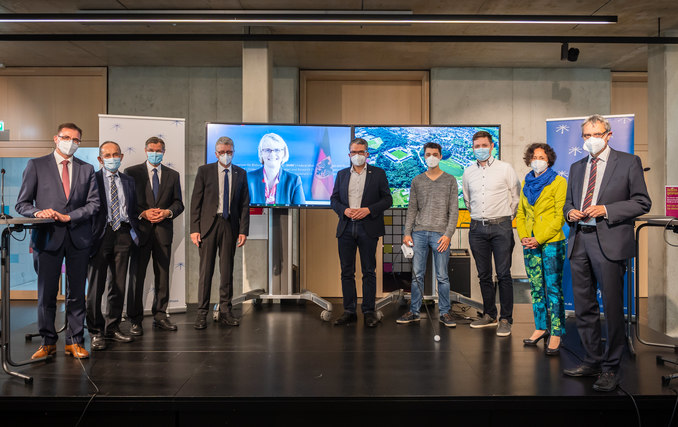Federal Minister Karliczek visits the Leading Research University, Aalen UniversityFederal minister of research, Anja Karliczek, in dialogue regarding the opportunities and challenges of cooperations between universities and the industry

Federal Minister of Education and Research Anja Karliczek speaks with Prof. Dr. Gerhard Schneider, Aalen University’s President, during a digital meeting, as well as representatives from the industry and government. Photo credits: Aalen University / Sandro Brezger
How does research work at universities of applied sciences? And how do collaborations with the industry develop? The Federal Minister of Research Anja Karliczek addressed these questions through a digital visit of Aalen University. In the discussion with university president Prof. Dr. Gerhard Schneider as well as representatives from the industry and government, Aalen University’s special role as a regional innovations motor was emphasized. The focus was on the contributions and impulse from the university in overcoming societal challenges like climate change, energy usage, electro mobility, or digitalization.
Universities of applied sciences (HAW) are taking on an increasingly important role in Germany’s innovation system. Through praxis-oriented vocational and further education of academic specialists and application-oriented research, they make significant contributions to scientific and societal developments. In the past years, the research activities at universities of applied sciences have drastically increased. Students benefit from the current practice-oriented teaching, and the scientific younger generations through the opportunity to pursue a PhD in demanding research projects, which open new career perspectives. But companies also benefit from the universities’ know-how and their research infrastructure.
A Tour de Force through the World of Aalen University
University President Schneider greeted all participants and presented a general lecture of the university’s central activities. There, he covered a broad spectrum from teaching during Corona conditions and positive developments in research activities to the university’s regional engagement in the explorhino Science Center or in the Innovationszentrum INNO-Z. Prof. Schneider showed his enthusiasm: “Through the engagement of our researchers, we belong to the nationally leading universities of applied sciences with our application-oriented research.” With the new research buildings, researchers are well-prepared for the future. At the same time, he vows to further expand funding programs at the state and national level, in order to better utilize available potential in the area of application-oriented research in the future.
Intensive Collaboration with the Regional Industry
Companies are involved in various research and development projects at Aalen University: whether as a cooperation partner or in a supervisory role to bring impulses and needs to the company’s attention. Alone through the Federal Ministry for Education and Research (BMBF) and with the university‘s project SmartPro, which was funded with around ten million euros, over forty companies from both SME’s and market leaders are active participants. In a lively discussion with Federal Minister Karliczek, Dr. Karl Lamprecht, executive head of Carl Zeiss AG, gave insights into Aalen University’s industry collaborations, along with Markus Maier, CEO of C.F. Maier GmbH & Co. KG and president of the IHK Ostwürttemberg, as well as Gerhard Grimminger, CEO of Kessler+ Co GmbH & Co. KG. The intensive and trusting cooperation as well as the university’s motivation to coordinate their activities to the needs of the region and thereby also address new needs like machine learning were all critical points. “We need highly educated young people for the future,” explains Lamprecht, chairman of Aalen University’s council. “For that, it is also important to have a close connection between companies and the university, which we maintain at ZEISS through various collaborations.”
The members of the German Parliament Margit Stumpp, Leni Breymaier, and Roderich Kiesewetter, as well as District Administrator Dr. Joachim Bläse also participated in the conversation and showed how deeply rooted Aalen University is in the region and that the university coordinates valuable contributions with its municipal partners to navigate the challenges in fields like digitalization, knowledge- and data-based economies, or climate change and resource preservation. Kiesewetter mentioned that Karliczek chose Aalen University for her visit due to all the reports of current projects he provided her with, and the Federal Minister felt invited to see the university firsthand.
Federal Minister Karliczek amazed by Aalen University
Another item on the visit’s agenda was a presentation for business ideas from the start-ups Q.big 3D and ADcase from the Innovation Center INNO-Z. High school graduate Thomas Bayer also presented his invention: a white cane that uses artificial intelligence. In closing, Federal Minister Karliczek gave a statement regarding her visit to Aalen University: “The German government and my political party have expanded our grants for technical universities and universities of applied sciences by around 50%, and Aalen University boasts an impressive portfolio. Technical universities / universities of applied sciences are important for the scientific and industrial status of Germany. Everything that these universities do especially well, be it praxis-oriented education and teaching, or a focus on application-oriented research – even in high tech fields, and last but not least, the close collaborations and knowledge transfer with the industry – all of this can be found at one place in Aalen.”
